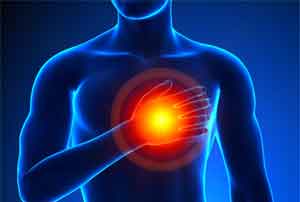- Home
- Editorial
- News
- Practice Guidelines
- Anesthesiology Guidelines
- Cancer Guidelines
- Cardiac Sciences Guidelines
- Critical Care Guidelines
- Dentistry Guidelines
- Dermatology Guidelines
- Diabetes and Endo Guidelines
- Diagnostics Guidelines
- ENT Guidelines
- Featured Practice Guidelines
- Gastroenterology Guidelines
- Geriatrics Guidelines
- Medicine Guidelines
- Nephrology Guidelines
- Neurosciences Guidelines
- Obs and Gynae Guidelines
- Ophthalmology Guidelines
- Orthopaedics Guidelines
- Paediatrics Guidelines
- Psychiatry Guidelines
- Pulmonology Guidelines
- Radiology Guidelines
- Surgery Guidelines
- Urology Guidelines
Young women and men with acute MI present with different symptomatology

Dr.Lichtman JH et al. studied the difference in presentation and perception of symptoms among young patients of different sexes.They reported that women and men suffering acute myocardial infarction (AMI) present with different symptomatology. Beyond identifying differences between the sexes, this study highlights the need for clinicians to include AMI in the differential diagnosis of young adults.The study has been published in Circulation.
It has been reported that women and men suffering acute myocardial infarction (AMI) present with different symptomatology. To ascertain this in adults aged ≤55, researchers analyzed data from standardized patient interviews in the multisite VIRGO study of 2985 patients hospitalized with AMI; patients were enrolled in a 2:1 female-to-male ratio (mean age, 47; 76% white).
Chest pain, pressure, tightness, or discomfort was a presenting symptom in 87% of women and 90% of men. Overall, women presented with a greater number of additional non–chest-pain symptoms than men; 62% of women and 55% of men presented with ≥3 such symptoms. In adjusted analyses, women aged >45 had a 40% greater likelihood of presenting without chest pain than men. Women with ST-segment elevation MIs were 50% more likely than men to present without chest pain. More than half of patients initially thought that their symptoms were due to a non–heart-related condition, with indigestion and acid reflux the most common self-diagnoses. Women were more likely than men to attribute their symptoms to stress and anxiety (21% vs. 12%); men were more likely to attribute them to muscle pain (21% vs. 15%). Women waited longer to seek medical attention (3.2 hours vs. 2.4 hours). Prehospitalization, more women than men had sought medical attention for similar symptoms (30% vs. 22%); over half of the women reported that the clinicians did not deem their symptoms to be heart-related (53% vs. 37% of men).
For more details click on the link :
Lichtman JH et al. Sex differences in the presentation and perception of symptoms among young patients with myocardial infarction: Evidence from the VIRGO study (Variation in Recovery: Role of Gender on Outcomes of Young AMI Patients). Circulation 2018 Feb 20; 137:781. (http://dx.doi.org/10.1161/

Disclaimer: This site is primarily intended for healthcare professionals. Any content/information on this website does not replace the advice of medical and/or health professionals and should not be construed as medical/diagnostic advice/endorsement or prescription. Use of this site is subject to our terms of use, privacy policy, advertisement policy. © 2020 Minerva Medical Treatment Pvt Ltd